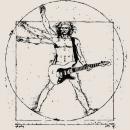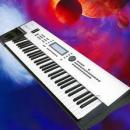Hola,
damoru escribió:
Es probable que tengas razón (no encontrar lo que busco). Y me tocaría los webs tener que comprar un teclado con sonido de piano, pues considero que ya tengo los mejores sonidos disponibles hoy en día (las posibilidades de un sampler software son infinitas al lado de la cacharrería hardware. Por mucho que hayan avanzado no es posible, de momento y que yo sepa, llevarse 9 gigas de muestras dentro de un stage piano).
En lo que se refiere a sonidos de piano, siento llevarte la contraria pero, en mi opinión, los pianos hardware de calidad suenan bastante mejor que el software. No sé en qué consiste pero a pesar de las diferencias abismales que deberían existir entre un piano de 9 Gb y el piano muestreado de un piano digital "bueno", no sólo es que no existen diferencias, es que el piano hardware suena mejor y es más musical. Yo he comparado mi P-90 con varios pianos soft (hablo de memoria el de Steinberg, otro llamado Ivory y con pianos de Gigasampler) y ninguno de ellos sonaba ni mejor, ni más convincente. De hecho todos sonaban peor que el P-90.
Fíjate en Soun on Sound, hablando del sonido de piano del MP-8 viene a decir que no sólo no hay diferencias con un piano de 4 Gb, sino que es el sonido más versátil de los que ha comparado.
As mentioned elsewhere in this review, the MP8's piano sounds compare favourably with some of the high-octane software pianos on the market. Out of interest, I did a direct comparison with two pianos that I hold in high regard — the Roland SRX11 Complete Piano expansion board installed in my XV5080 (a version of which apparently graces Roland's new RD700SX), and Vintaudio's Yamaha C7 (close-miked version) running under NI Kontakt 2. The Vintaudio C7, incidentally, uses 4GB of samples, comprising six velocity layers with pedal up, down and release layers. The SRX11 has no pedal down or release layer, but all 88 notes have been sampled across four velocity layers. The MP8 appears to have been sampled at every fourth semitone, and has a release layer but no pedal down layer (although it does have the Damper Effect and String Resonance to compensate). The number of velocity layers on the MP8 is harder to determine — clearly Kawai's Harmonic Imaging method is very effective!
I chose three existing projects to run in Sonar, each of which was piano-driven but with the emphasis varying between rock and orchestral. The results were very illuminating — all three pianos acquitted themselves admirably. However, what did become clear is that there is no such thing as the universally 'perfect' piano sound. Where one piano suited a certain piece, it sat less comfortably in another. The MP8 is arguably the most versatile of the three, having more tonal variations to choose from — however, within classical/orchestral passages the SRX11 was the most effective, possibly due to the fact that its samples are not as close miked as the MP8 or C7, hence it sounded more natural in a classical context. Both the MP8 and SRX11 responded in a very consistent and musical manner to the pre-recorded performances' key velocities, whilst the C7 tended to over-react slightly at lower velocities.
Puedes leer el análisis completo de este piano en
http://www.soundonsound.com/sos/nov05/a ... waimp8.htm
En definitiva, que algo tendrá el agua cuando la bendicen y que no sólo de muestras vive un sonido. Hay más cosas. Por eso se siguen fabricando y vendiendo pianos digitales.
Salu2









